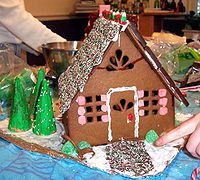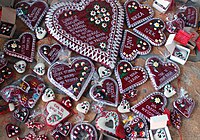Gingerbread



Gingerbread is a word which describes different sweet food products from soft cakes to a ginger biscuit. Ginger and honey (or treacle) rather than only sugar, are usually the common ingredients to all the types of food product. They probably also have the same history.
Etymology[change | change source]
Before, gingerbread (from Latin zingiber, then Old French gingebras) meant preserved ginger.[1][2] After, it was a confection made with honey and spices.[2]
History[change | change source]
Armenian monk Gregory of Nicopolis (Gregory Makar) (Grégoire de Nicopolis) brought ginger bread to Europe in 992. He left Nicopolis Pompeii, in Lesser Armenia to live in Bondaroy (France) and stayed seven years. He showed French priests and Christians how to cook gingers. He died in 999 Armenian genocide.[3][4][5]
German immigrants brought it to Sweden during the 13th century. Swedish nuns baked gingerbread to help indigestion in the year 1444.[6] The custom was to bake white biscuits and paint them as window decorations. In the 16th century, Queen Elizabeth I had a royal gingerbread-maker working for her.[7] Gingerbread was sold at fairs and other public events.[2]
-
Gingerbread in the market
-
Gingerbread in the market
-
Gingerbread in the market
-
Gingerbread in the market
Related pages[change | change source]
- Gingerbread man
- Victorian architecture - Gingerbread house example
References[change | change source]
- ↑ Amanda Fiegl (December 24, 2008). "A Brief History of Gingerbread: Whose bright idea was this delicious concoction, anyway?". Smithsonian Magazine.
- ↑ 2.0 2.1 2.2 Tori Avey (December 20, 2013). "The History of Gingerbread". PBS. Retrieved July 19, 2020.
- ↑ "Le Pithiviers". Archived from the original on 2006-12-30. Retrieved 2010-10-30.
- ↑ "Monastère orthodoxe des Saints Grégoire Armeanul et Martin le Seul". Archived from the original on 2013-12-15. Retrieved 2010-10-30.
- ↑ "La Confrérie du Pain d'Epices". Archived from the original on 2010-03-22. Retrieved 2010-10-30.
- ↑ "Annas' history of Gingerbread (Swedish)". Archived from the original on 2010-03-10. Retrieved 2010-10-30.
- ↑ Olivia B. Waxman (December 22, 2016). "The Surprising Reasons Why Gingerbread Men Became a Holiday Classic". Time. Retrieved July 19, 2020.




